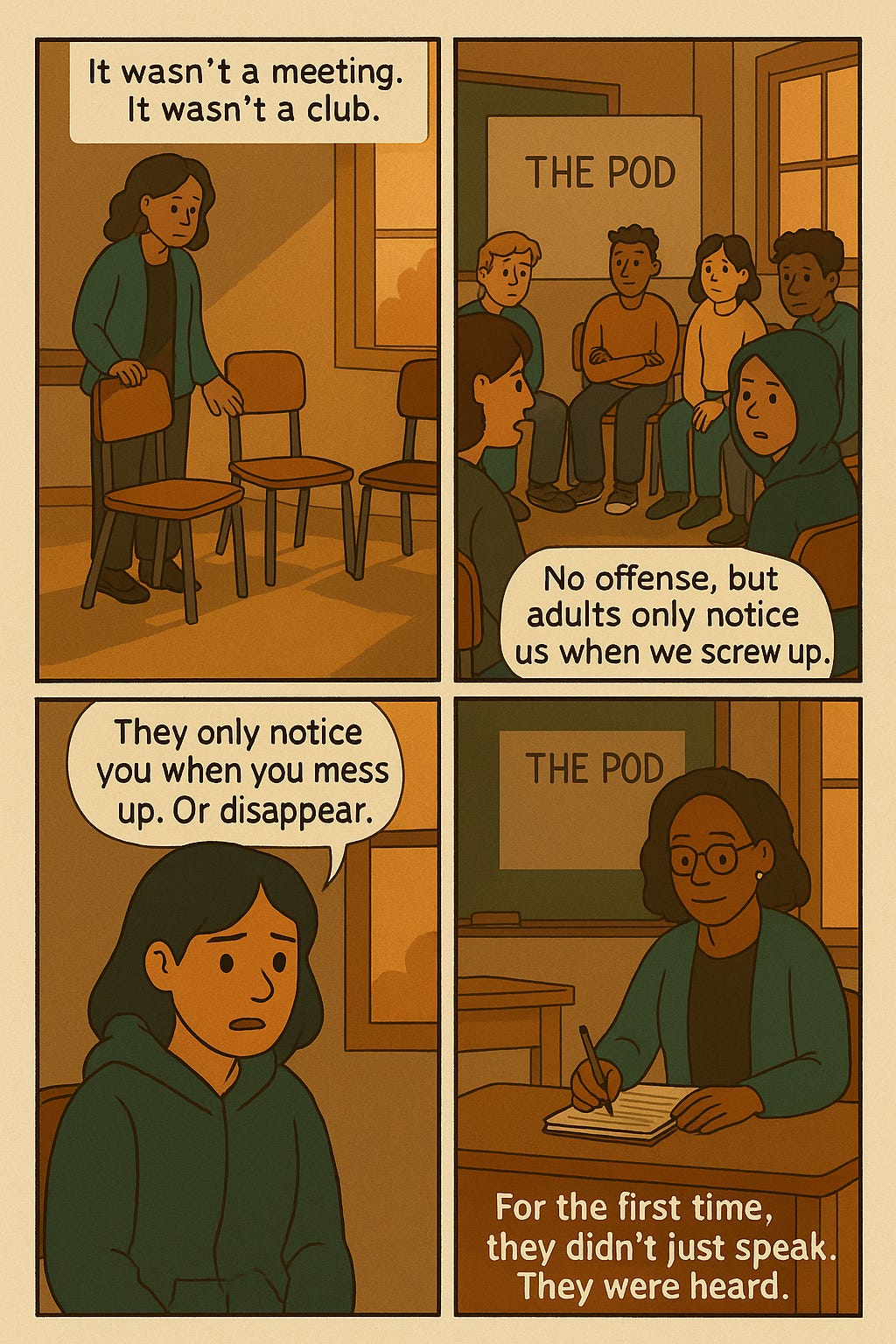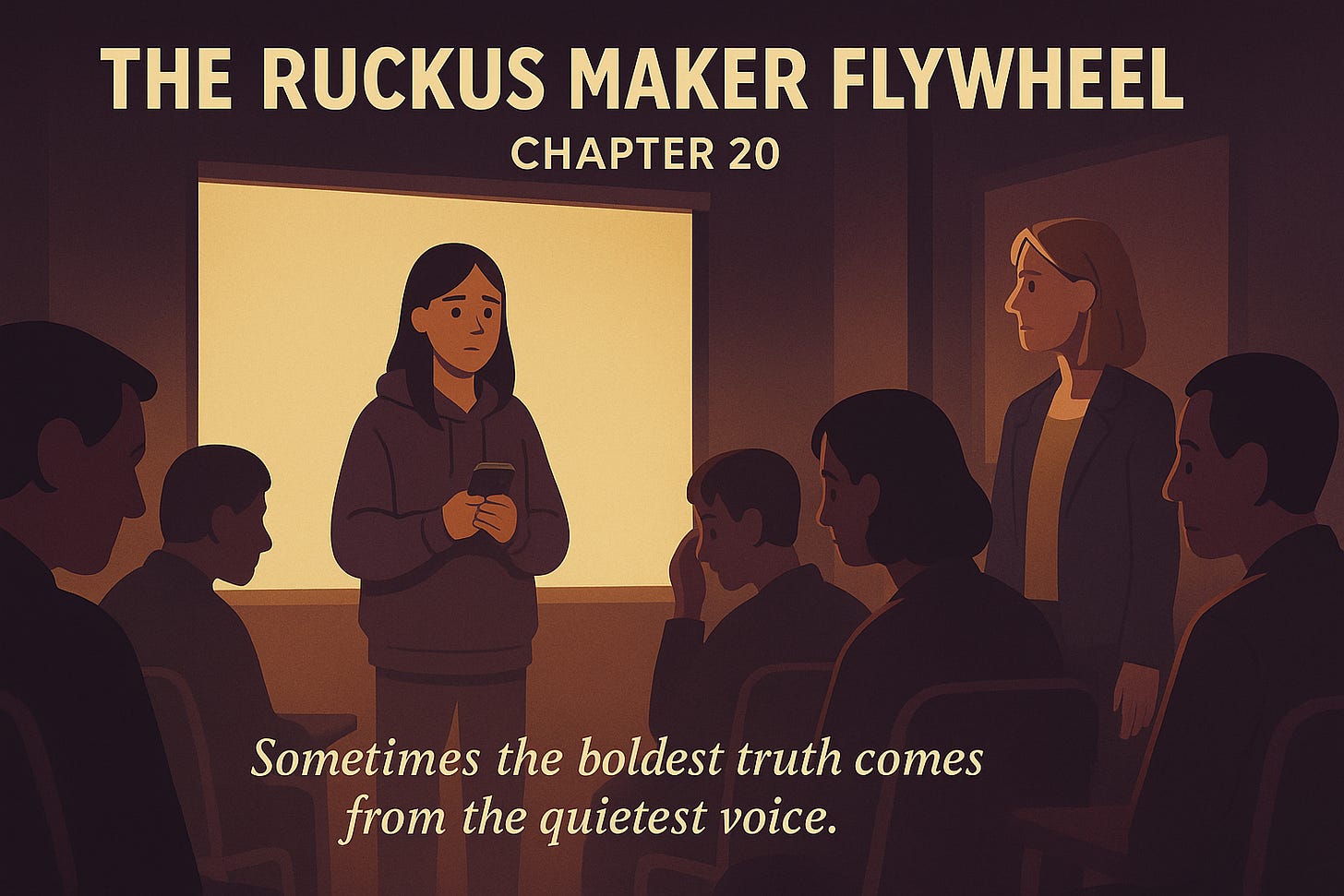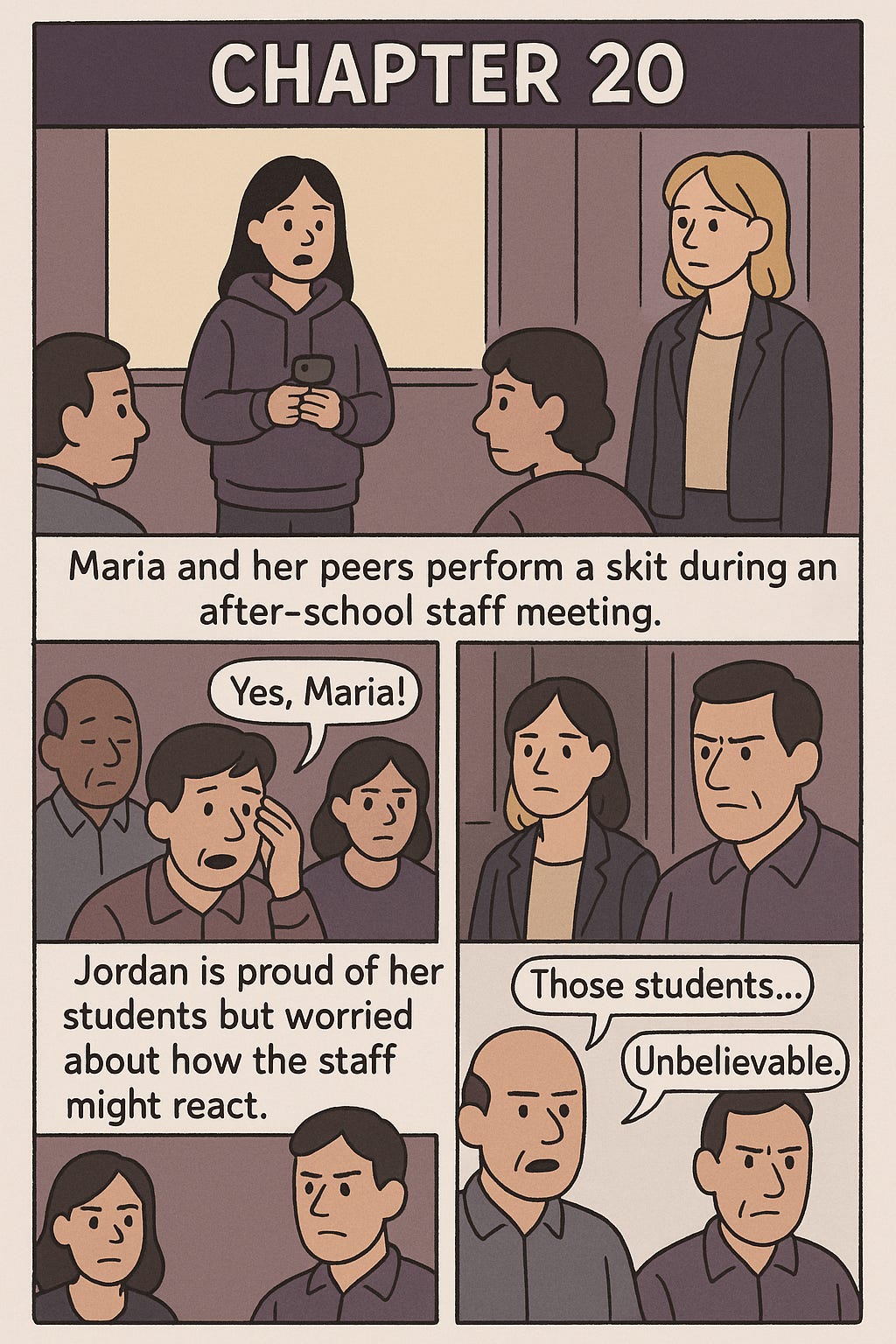“They only notice you when you mess up. Or disappear.”
Chapter 19 + 20 in The Ruckus Maker Flywheel
👋 Welcome to a 🔓 free edition 🔓 of Ruckus Makers — the newsletter for bold school leaders who Do School Different. Each week we drop fresh content across our signature styles:
The Reframe → Mindset shifts in 90-seconds.
Dot AI → Supercharged leadership prompts and custom gpts
MEH → The Onion meets Education. What could go wrong?
First in Line → Exclusive access to content before the bookshelf.
The Automatic School → A system that moves you FROM bottleneck TO breakthrough
The Hot Seat → Coaching calls turned into case studies
💡Premium subscribers get access to custom GPTs, full archives, advanced tools, and Digital Danny — your AI-powered coach. Upgrade here.
Starting this week, I’ll ship two chapters on a Saturday instead of one each Sat/Sun.
Chatper 19: The Pod
Jordan shifted the chairs into a circle, then back again.
Too tight.
Widened.
Too cold.
She stood in the center of Room 112, palms damp, heart thudding harder than it had during the last staff meeting. That was predictable. Adults postured, resisted, occasionally nodded. But this? This was wild terrain.
Five students had said yes. One had ignored the invitation. And one — Maria — had walked by her in the hallway earlier that day and paused just long enough to make eye contact. Not a glare. Not a smile. Just … a signal.
Jordan didn’t dare read into it.
She stepped back from the chairs, glanced once more at the board:
“The Pod: A Space to Be Heard. To Lead. To Dream.”
And beneath it, three hand-written questions:
What’s one thing that matters to you on this campus?
What’s one thing you wish adults understood?
What’s one thing you’d change if you could?
The bell rang. Jordan’s stomach turned.
Five students trickled in — a junior who ran the morning announcements, a sophomore who painted murals, a senior who wore earbuds constantly, and two freshmen she barely knew. They nodded, sat, avoided eye contact.
Then the door creaked again.
Maria walked in.
She didn’t speak. Just took the last chair, pulled her hoodie sleeves over her hands, and stared at the floor.
Jordan swallowed the lump in her throat.
“Thanks for being here,” she began. “This is… new. Not a club. Not a class. I won’t be running the show.”
A pause. A breath.
“I’m here to listen.”
Nothing.
And then, like slow drips into a bucket, the conversation began.
The muralist spoke first — something about how ugly the vending machine hallway was. The announcement kid joked that no one ever actually listened to the announcements. The freshman with the braided bun talked about how scary it felt to eat alone at lunch. Another mentioned bathrooms being locked — again.
Then the boy with earbuds surprised them all.
“You know what would help?” he said, pulling one earbud out. “If we just had one adult we could talk to. Like, for real.”
Jordan nodded. “That makes sense.”
He turned to her. “Not you, though. No offense. You’re the principal.”
Laughter. It broke the tension.
Jordan smiled. “Fair.”
The group kept going, ideas building on each other — less locked doors, more color in classrooms, one student daring to say, “Maybe we need to talk about stuff that actually happens — like fights, mental health, teachers playing favorites.”
Jordan said little. She wrote fast.
Then came silence.
It hung for a beat too long.
And that’s when Maria spoke.
“I think most adults assume we’re fine if we’re not causing problems,” she said, voice low but steady.
Heads turned.
“They only notice you when you mess up. Or disappear.”
No one laughed.
Maria didn’t elaborate. She didn’t need to.
Because something about her words shifted the room. Everyone felt it.
Jordan did too.
It was the truth — and not the kind adults liked to print on mission statements.
The bell rang again.
Chairs scraped.
Students grabbed backpacks. One of them — the freshman with the bun — lingered, then asked, “Are we doing this again?”
Jordan smiled.
“If you want to.”
They nodded.
The room emptied.
Jordan sat alone, journal open in her lap. She didn’t write right away. She just stared at the board. Then, slowly, she circled Maria’s words:
“They only notice you when you mess up. Or disappear.”
A knock at the door startled her.
It was the announcement kid.
“Hey,” he said, glancing back down the hall. “This thing’s got a name?”
Jordan paused.
“Yeah,” she said. “It’s called The Pod.”
He nodded once. “Cool name.”
And then he was gone.
Jordan sat back, unsure of what would come next — but certain of one thing:
This mattered.
Even if no one else saw it yet.
Chapter 20: The Spark
The staff room still smelled like stale coffee and Expo markers.
Jordan clicked off the fluorescent lights and let the soft glow of the projector set the mood. Folding chairs scraped against tile as teachers shuffled in, some balancing Chromebooks, others whispering jokes about late buses and lost planning periods.
"Thanks for staying late," Jordan said. "Tonight’s presenters asked for ten minutes of your time. That’s all I’ll say.”
She stepped aside.
Maria led the group in. Four students — three from 8th grade, one bold 7th grader — stood shoulder to shoulder. Maria carried a clipboard and wore a hoodie with sleeves too long, the hem chewed nervously between her fingers.
No one clapped.
Then the lights dimmed a little more.
And Maria began.
“Hi. We’re the advisory pod. We’ve been meeting every week. Today we’re going to show you what we wish school felt like.”
She stepped back.
The skit began with a student slumping into a desk. Another, playing “the teacher,” stood over her.
"Why didn’t you do your homework?”
“I was up all night with my little sister. Mom works third shift.”
“Excuses. You need to learn responsibility.”
Laughter bubbled from the student audience, but it was a quiet, uncomfortable laugh.
The skit continued. Scenes of rigid discipline. Ignored emotions. One student, playing himself, looked up and said:
“I learned how to hide my real self in school. That’s how you survive.”
A silence filled the room like fog.
Then Maria stepped forward again.
“We’re not trying to be disrespectful. We just wanted to show you what it’s like. And what it could be.”
The final scene showed a different classroom.
A teacher listened.
A student cried.
Another one laughed.
The bell rang — and no one rushed out.
When the lights came back up, no one moved.
Jordan scanned the room. Mr. Trask, arms folded, leaned back with furrowed brows. Ms. Ainsley had her hand to her mouth. Holloway stared at the floor.
Then a voice broke the tension.
“That was... real,” said Ms. Reilly, the music teacher. “I’ve been here twenty years, and I don’t think I’ve ever heard students talk like that.”
Someone else cleared their throat. “It stings a little.”
“Maybe it should,” said Ainsley quietly.
Trask rolled his eyes, but said nothing.
Jordan stepped forward, her voice low but steady.
“Thank you, pod. You showed us a mirror — and a window. That’s rare.”
Maria looked over her shoulder at Jordan. Just a glance.
It said: “Did we do it?”
Jordan nodded. Just once.
She didn’t say a word.
She didn’t need to.
The spark was lit.
And this time, it didn’t come from her.





